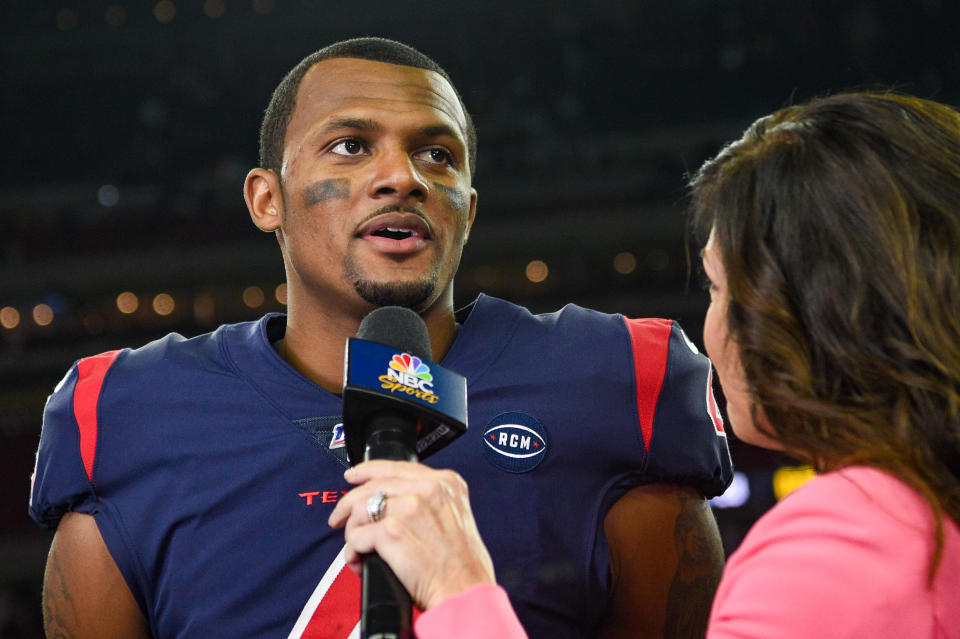In streaming wars, live sports could set NBC's Peacock apart
Comcast and NBCUniversal last week unveiled some details about Peacock, the streaming service set to launch nationally in July.
It will launch with three price tiers: a completely free version that has ads and a limited volume of content; a $4.99-per-month version with ads and more content; and a $9.99-per-month ad-free level. (For Comcast and Cox cable subscribers, tier two will be free, and tier three will be $4.99.)
As the reaction from many TV viewers on Twitter and media pundits went: Another streaming service?
Yes, another one. Despite the flood of spending on original content and the crush of competitors, NBC and parent company Comcast (CMCSA) can’t afford to sit this race out.
It’s no accident that the service will launch just days before the start of the 2020 Summer Olympics in Tokyo. NBC has the Olympics broadcast contract through 2032, and the Summer Games provides the service with an obvious promotional base, especially when many U.S. viewers will be looking for an easy way to stream specific events they care about. Peacock’s pitch becomes clear.
In fact, CFRA media analyst Tuna Amobi says: “I think the sports offering really will set this service apart from others.”
Olympics Ceremonies, exclusive Premier League matches
Peacock will have live coverage of the Opening and Closing Ceremonies from Tokyo before they air on NBC, 140 Premier League soccer matches not shown on television, and full live Ryder Cup golf coverage.
Beyond that, Comcast has not been specific about sports content, but the service can conceivably pull live and replay content from NBC’s many sports broadcast partners, and that gives it an immediate advantage over existing competitors.
NBC and NBC Sports have broadcast deals with quite a lot of sports entities: NFL Sunday Night Football; NHL; Nascar; Notre Dame college football; Tour de France cycling; Premier League soccer; Premier Lacrosse League, and more. Comcast also owns Golf Channel and Sky Sports, and just announced a sports tech accelerator that leverages all of those brands.
The competition doesn’t have live sports
Netflix doesn’t have any live sports. Disney+ doesn’t have any live sports. Amazon has spent to stream a few live games here and there, including 10 Thursday Night Football games per season. Apple TV+ doesn’t have any live sports, but would clearly like to have some: Apple is reportedly in talks to buy a stake in Pac-12 Network.
Disney-owned Hulu has a “Hulu + Live TV” package and has advertised it using pro athletes declaring, “Hulu has live sports!” Disney-owned ESPN+ has a raft of live sports, mostly more niche games that you can’t find on ESPN’s linear channels. DAZN, a European streaming service that costs $19.99 per month, has boxing, MMA, and a baseball commentary show with “live look-ins” at MLB games.
“Our sense is that Peacock is going to have a better than longshot to become one of the viable players,” Amobi says, “just because of the resources of the parent company and the content.”

Of course, separate from all the sports, there will be a raft of NBC sitcoms and dramas exclusively streaming on Peacock. (Think “Law & Order,” “The Office,” “Two and a Half Men,” and “Frasier.”) When you add the scripted television to the live sports, CFRA says Comcast’s stated target of 30 million subscribers by 2024 “could be very conservative.” (Even Disney’s stated goal of 60 to 90 million Disney+ subscribers by 2024 looks like an intentionally low bar.)
Even with sports as a sweetener, every analyst expects that in a few years, the streaming bubble will stop expanding and will begin to contract—and some of the offerings will die off. Discovery CEO David Zaslav predicts “carnage.”
But when that happens, experts predict that the giants are likely to survive, because they can keep spending for longer. That’s good for Netflix, Apple, Disney, NBC (Peacock), and AT&T (HBO Max and WarnerMedia), but bad for independent offerings like Topic, from First Look Media.
“There’s going to be an inevitable shakeout in this space,” says Amobi. “Whether that happens in the next two years or five years remains to be seen. One thing I know is that the major conglomerates that have the studios, content, and resources to weather the near-term losses are more likely to stay in the game longer-term. Sooner than later, some of the mid- to smaller-tier players could be rolled up. That’s already happening right now when you see names shut down, like [Sony PlayStation] Vue.”
—
Daniel Roberts is an editor-at-large at Yahoo Finance and closely covers Netflix, Disney, and the streaming wars. Follow him on Twitter at @readDanwrite.
Read more:
Comcast sports tech accelerator will leverage NBC, Nascar, and Universal theme parks
Disney+, Apple TV+ and Netflix can coexist—for now
Discovery CEO predicts ‘carnage’ in the streaming wars
When will America hit peak streaming?
Can we trust Netflix’s viewership numbers?
Disney+ success is crucial to Disney’s future, Bob Iger has made clear
